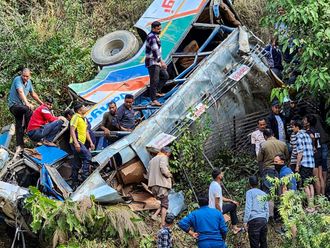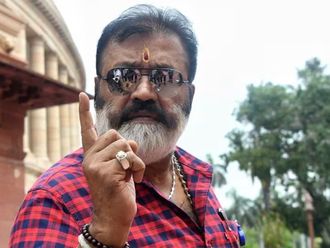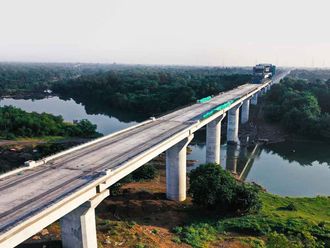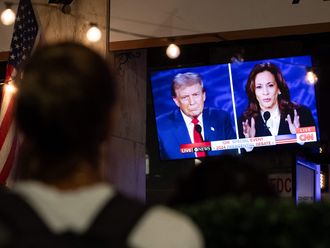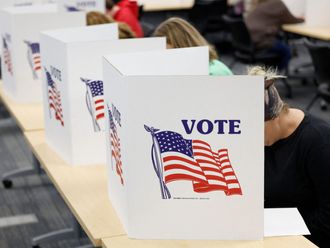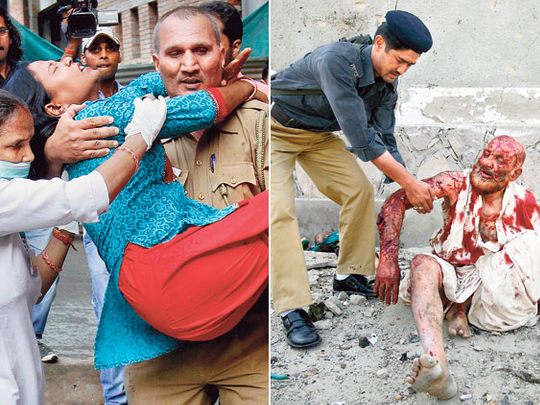
Srinagar: Indian police detained for questioning three people on Thursday, including the owner of an Internet cafe in Indian-ruled Kashmir region over an email allegedly claiming responsibility for a deadly bombing of the New Delhi High Court, police said.
A powerful bomb hidden in a briefcase outside the High Court killed at least 11 people on Wednesday.
Senior police officers told Reuters said they had detained the owner of an Internet cafe in the Kishtwar region of Kashmir where they suspect the email was sent from early on Wednesday.
Indian authorities are investigating a claim of responsibility allegedly made in the email by the Harkat-ul-Jihad Islami militant group, an Al Qaeda affiliate with bases in Pakistan and Bangladesh. It has claimed responsibility for attacks in India in the past.
Several Islamist group have been fighting against Indian rule of the disputed region of Kashmir.
Terrorism
India and Pakistan fell victim to terrorism again Wednesday when blasts in New Delhi and Quetta claimed 35 lives.
Terror group Harkat-ul-Jihadi Al Islami (HuJI) claimed responsibility for the powerful blast yesterday morning at the reception counter of the Delhi High Court killing 11 and injuring at least 76.
The Pakistani Taliban said it was behind the twin bombings in Quetta that targeted security forces responsible for the recent capture of senior Al Qaida operatives killed 24 people and wounded 82 others.
The death toll in the DElhi blast is expected to rise as many of those injured are in critical condition.
HuJI claimed the attack was in retaliation to the death sentence awarded to December 13, 2001 terror attack accused Afzal Guru, who is on death row.
"We owe the responsibility of today's blasts at high court delhi [sic] ... our demand is that Afzal Guru's death sentence should be repealed immediately else we would target major high courts & THE SUPREME COURT OF INDIA [sic]," an e-mail sent from the id: harkatuljihadi2011@gmail.com read. Experts are trying to locate the source of the e-mail.
Nitrogen-based explosive
Special Home Secretary U.K. Bansal later announced that the initial investigation carried out by the NIA suggested that about two kilograms of nitrogen-based explosive, packed inside a briefcase, was used in the blast that left a two-feet wide and one-foot deep crater.
The attack came as Indian Prime Minister Manmohan Singh was winding up an official visit to Bangladesh yesterday. "This is a long war in which all political parties, all the people of India have to stand united so that the scourge of terrorism is crushed," Singh said in Dhaka.
Home Minister P. Chidambaram announced in the Lower House of Indian Parliament that the Delhi Police had been tipped off about a possible terror attack way back in July. He denied the attack was caused by lax security since the police were already on high alert given the ongoing session of Parliament in New Delhi.
"Intelligence pertaining to threats emanating from certain groups was shared with Delhi Police in July … Despite Delhi Police remaining on high alert, the tragic incident occurred today," Chidambaram said.
He added that the National Investigation Agency (NIA), a specialised anti-terror agency, is investigating the explosion, which was the second terror attack on the Delhi High Court after the May 25 low intensity blast seen as a trial run for yesterday's incident.
What is extremely worrying is the blast took place in a high security area with Parliament, the Prime Minister's Office and India Gate in close vicinity.
In Pakistan, one attacker detonated his bomb-laden car outside the residence of the deputy chief of the Frontier Corps in Quetta city, before a second attacker blew himself up inside the house.
The attack on the residence of deputy chief Farrukh Shahzad wounded him, killed his wife and injured at least one of his children, security officials said. The attacks at rush hour struck an area packed with security forces guarding Quetta's officials and government buildings.
- With inputs from agencies



